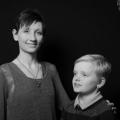Warning, this blog contains some content about eating disorders that may be triggering to some readers
I used to believe all the stigma, all the rumours, lies and misunderstandings surrounding eating disorders.  I’d stare at the waif-like girls and joke, what she needs is a good meal. I even thought purging was plain wrong and something I’d never do myself. Or at least I did, until it happened to me.
I’d stare at the waif-like girls and joke, what she needs is a good meal. I even thought purging was plain wrong and something I’d never do myself. Or at least I did, until it happened to me.
I used to believe that eating disorders were a choice
For most of my life I’d lived relatively eating disorder free. By relatively I mean there had been no obvious disordered behaviours I was aware of. In November last year that all changed when, at the age of 31, I was diagnosed with an eating disorder. Anorexia Nervosa to be precise. I was shocked and I’m still trying to come to terms with the diagnosis. I used to believe anorexia was a choice young girls made just to look a certain way and could eat if they really wanted. I certainly didn’t see anorexia as a serious and complex psychiatric disorder. I’m now utterly ashamed I once thought like that but when something doesn’t directly affect your own life you tend not to think about it too much. That may be a controversial thing to say, but I like controversy. I’ve learnt along the way that controversy GETS PEOPLE TALKING!!! So I encourage people to talk about controversial subjects so they become normal. Mental illness, including eating disorders, is still a controversial subject but it shouldn’t be that way. Not now, not in 2015.
I’m doing my bit to extinguish stigma and discrimination
I don’t want people to accept the rigid and often misleading preconceptions of mental disorders as truth as they are mostly completely wrong. Yes, I used to be one of those people but now I’m turning it around. I haven’t begun my recovery yet and still very active in my eating disorder behaviours. I’m writing my story to help my recovery, to make sense of what has happened to me. Writing feels right and I hope that one day my writing may help others. Right now I’m doing my bit to extinguish the stigma and discrimination which makes asking for help so much harder.
I need to talk, and I need to fully combat my own stigma
I was also diagnosed with Emotionally Unstable Personality Disorder (EUPD) last year but with a different team of mental health professionals. I tend to use the other term, Borderline Personality Disorder (BPD) as I think emotionally unstable makes me sound like I cry a lot. I don’t, I haven’t cried in a long time. BPD is so much more than that and is also one of the most stigmatised mental illnesses. For me BPD makes sense. It answers questions, and it gives a reason to a lot of my behaviours. Not an excuse, but a reason. I’m very open and honest about my BPD diagnosis and I think because of this I haven’t experienced too much stigma. Before I was diagnosed my life was a different story. I hadn’t a clue what was going on and I was a confused mess. The stigma and discrimination I experienced were towards my BPD behaviours. I didn’t know how ill I was and neither did anybody else.
Now I can talk BPD all day long. I find anorexia hard to talk about. I need to talk, and I need to fully combat my own stigma. My anorexia and BPD are so intertwined I can’t work on one and not the other. It’s still very early days for me but I am a work in progress and excited about the future. Recovery is possible for me, and getting rid of stigma and discrimination is possible too!
What do you think about the issues raised in this blog?
Comment below or sign our pledge wall to show your support and find out how talking tackles mental health discrimination.
SOURCE: Time To Change – Eating disorders – Read entire story here.



